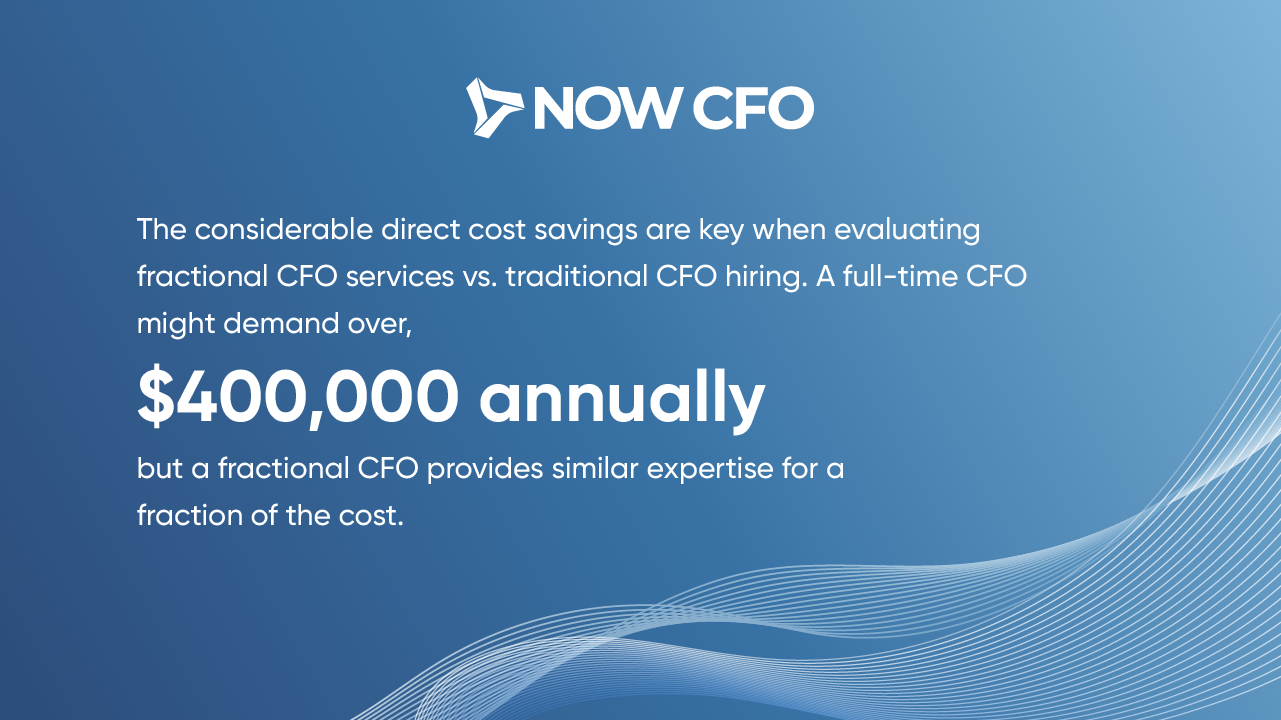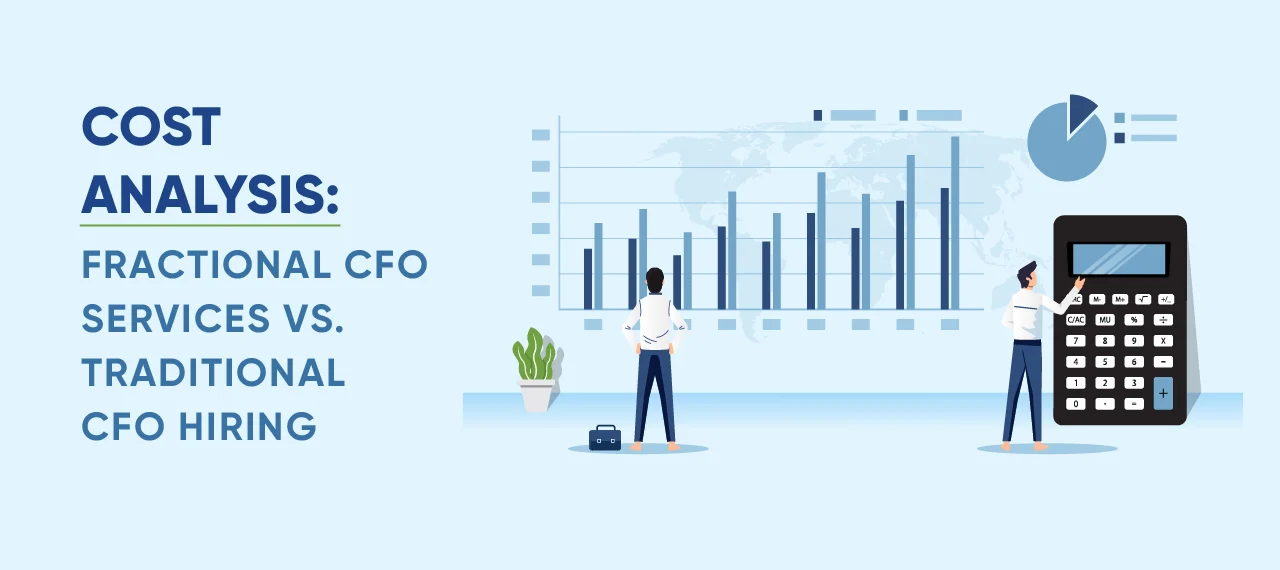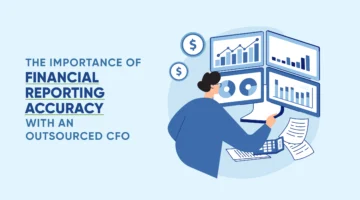Cost Analysis: Fractional CFO Services vs Traditional CFO Hiring
Measurable data and strategic cost analysis drive the decision between fractional CFO services vs traditional CFO hiring. Business leaders increasingly rely on complex numbers to guide their financial leadership decisions.
Introduction to CFO Cost Models
Understanding the financial leadership models is critical. This section outlines the key roles, definitions, and cost considerations when evaluating fractional CFO services vs traditional CFO hiring. By leveraging industry statistics and authoritative data, business leaders can make informed decisions aligning with short-term and long-term strategic goals.
Overview of CFO Roles and Their Importance in Business
CFOs are integral to a company’s financial health, providing strategic oversight, risk management, and capital allocation. In the USA, CFOs earn an annual salary of $350K to $500K.
Their responsibilities extend beyond number crunching to include long-term planning and operational efficiency, underscoring why evaluating fractional CFO services vs traditional CFO hiring is a strategic priority for growth-focused organizations.
Definition of Fractional CFO Services
A fractional CFO is a seasoned financial expert who offers part-time or project-based services to organizations. This model, often referred to as CFO as a service, provides flexible, on-demand expertise without the financial commitment of a full-time hire.
Businesses benefit from reduced overhead costs and scalable engagements, enabling them to access high-level financial guidance tailored to specific needs. This cost-effective alternative is key in discussing fractional CFO services vs traditional CFO hiring.
Learn More: Fractional CFO vs Full-Time CFO
Explanation of Traditional CFO Hiring
Traditional CFO hiring involves employing a full-time executive whose responsibilities cover all aspects of financial management. This model demands a substantial salary, benefits, and long-term compensation investment.
For instance, the U.S. Bureau of Labor Statistics reports that Chief Executives have a median annual wage of approximately $258,900. While this approach provides deep integration and continuous oversight, it also introduces higher fixed costs than the fractional model.
Importance of Cost Analysis in Financial Leadership Decisions
A rigorous cost analysis is essential when comparing fractional CFO services vs traditional CFO hiring. Businesses must weigh direct costs like salaries and benefits against indirect costs such as overhead, training, and opportunity expenses.
Data-driven comparisons help reveal that fractional CFOs can lower total financial expenditure by offering expert services as needed. This analytical approach ensures that companies optimize cash flow and achieve better ROI, a necessity in today’s competitive market.
Objectives of Comparing Both Models
The primary objective of this analysis is to quantify each CFO model’s financial impact. Business leaders can determine which model delivers the highest value by comparing the high fixed expenses of traditional CFO with fractional CFO services. In doing so, this comparison addresses critical questions such as:
- How do the costs differ in measurable terms?
- What are the short-term and long-term ROI implications?
- How does each model align with strategic growth objectives?
These insights provide a clear framework for decision-making, reinforcing the importance of understanding fractional CFO services vs traditional CFO hiring.
Brief Summary of Key Cost Considerations
In summary, the key cost considerations include:
- Direct Costs: Salaries, benefits, and fixed overhead expenses associated with full-time hires.
- Indirect Costs: Onboarding, training, and opportunity costs that impact overall financial planning.
- Flexibility and Scalability: The ability to adjust service levels based on immediate business needs versus long-term strategic commitments.
- ROI and Efficiency: Measurable improvements in cash flow, profit margins, and operational efficiency when using a fractional CFO.
Companies can conduct a comprehensive financial leadership cost comparison by focusing on these elements and deciding which is best for them.
Learn More: Hiring a Fractional CFO
Detailed Cost Structure of Fractional CFO Services
Now, we dive into the numbers behind fractional CFO services vs traditional CFO hiring, focusing on direct cost savings and budget implications.

Pricing Models for Fractional CFO Services
When considering a fractional CFO, pricing is typically based on hourly rates or monthly retainer fees. Studies show that the average hourly rate for fractional CFOs is up to $150.
For many businesses, the monthly retainer often falls around $12,000 on average. This pricing model is central to discussing fractional CFO services in cost analysis, offering significant savings compared to traditional hires.
Direct Cost Savings Compared to Full-Time Salaries
The considerable direct cost savings are key when evaluating fractional CFO services vs traditional CFO hiring. A full-time CFO might demand over $400,000 annually, but a fractional CFO provides similar expertise for a fraction of the cost.

This difference is critical; companies can avoid high fixed expenses and pay only for the time needed. Such savings can exceed $100,000 annually, freeing up capital for growth investments.
Flexibility in Engagement Duration and Scope
Another significant advantage is flexibility. With fractional CFOs, engagement duration, and scope can be adjusted to meet specific business needs. This flexible financial leadership allows companies to scale services during rapid change without long-term commitments.
Whether the business is launching a new product line or managing cash flow challenges, the fractional model offers agile support that traditional CFO hiring cannot match.
Impact on Overhead and Operational Expenses
In addition to direct salary savings, fractional CFO services help lower overhead costs. Traditional CFOs add significant operational expenses, including benefits, office space, and equipment, raising traditional CFO hiring costs.
By contrast, outsourcing CFO services minimizes these indirect expenses, making the fractional model more appealing from budget implications for CFO models standpoint.
Variable Cost Factors and Service Customization
Cost factors also vary based on the complexity of the business and the specific services required. A fractional CFO engagement can be tailored to include only the necessary strategic tasks, such as financial forecasting, risk management, or cash flow analysis.
This customization means that companies pay solely for what they need, a key aspect of cost-effective financial leadership.
ROI and Cost Efficiency Metrics
Crucially, the ROI of fractional CFO services is measured by immediate cost savings and improvements in financial performance. Data-driven metrics such as increased profit margins, better cash flow management, and streamlined budgeting processes contribute to a favorable ROI.
Financial Implications of Traditional CFO Hiring
Next, we focus on the financial realities of hiring a full-time CFO, enabling a comprehensive comparison of fractional CFO services vs traditional CFO hiring.
Salary, Benefits, and Long-Term Compensation Packages
Traditional CFO hiring comes with high salary demands and extensive benefits. The overall compensation package can push annual costs beyond the base salary. For instance, full-time CFOs in the U.S. may earn upwards of $400,000 per year, not including the indirect costs of benefits and office infrastructure.
Fixed Costs and Overhead Considerations
Fixed costs associated with full-time CFOs include their salaries, benefits, and overhead expenditures. These additional costs contribute to a heavier financial burden when comparing fractional CFO services vs traditional CFO hiring.
In contrast, fractional CFOs allow companies to avoid these fixed expenses, offering a more scalable and cost-effective solution.
Onboarding and Training Expenses
Integrating a full-time CFO into a company also entails onboarding and training expenses, further adding to the overall cost. Aligning the CFO with company culture and operational systems is time-consuming and costly. This aspect of traditional CFO hiring costs can be a deterrent for businesses with limited resources.
Opportunity Costs of a Full-Time CFO
Opportunity cost is another critical factor. Allocating a substantial portion of the budget to a full-time CFO may divert resources from other key areas, such as marketing or R&D.
When evaluating fractional CFO services vs traditional CFO hiring, the opportunity cost of a full-time CFO is particularly pronounced in smaller organizations that require agile, efficient financial leadership.
Long-Term Investment and Strategic Value
While full-time CFOs offer long-term strategic value and deep integration into the company, this benefit comes at a high cost. The long-term investment in a traditional CFO is justifiable for large enterprises with complex financial operations, but it may not be practical for businesses with leaner budgets.
A careful financial leadership cost comparison helps determine whether the strategic value outweighs the expense.
Comparison of Direct vs. Indirect Costs
A comprehensive cost analysis must include direct (salary, benefits) and indirect (overhead, training, opportunity costs) expenses. Companies often find the fractional model’s overall expense considerably lower when performing a financial leadership cost comparison between fractional CFO services vs traditional CFO hiring.
Comparative Analysis: Fractional CFO vs. Traditional CFO
Now we turn to a direct comparison, breaking down the cost differences and strategic benefits
Overall Cost Comparison and Budget Impact
A detailed analysis reveals that the overall cost for a fractional CFO is significantly lower. Businesses can save on salary, benefits, and overhead expenses by choosing a fractional CFO. These direct savings translate into a more efficient allocation of financial resources, a core benefit highlighted in cost analysis fractional CFO services discussions.
Flexibility and Scalability in Cost Management
The fractional model provides unmatched flexibility. Companies can adjust the scope of services based on current needs. This flexibility is critical in fractional CFO services vs traditional CFO hiring, as it ensures that expenses remain variable and aligned with business cycles.
ROI Analysis: Short-Term Savings vs. Long-Term Value
When comparing the two models, short-term savings are evident. Fractional CFOs deliver immediate cost reductions and improved financial efficiency, while traditional CFOs, though offering long-term strategic oversight, require a much larger upfront investment.
For many businesses, the ROI of fractional CFO services, measured in improved cash flow and cost savings, makes it the preferred choice.
Efficiency in Resource Allocation
A fractional CFO’s part-time engagement means that funds saved on fixed costs can be reinvested into other business areas. This efficient resource allocation is a central theme in fractional CFO services vs traditional CFO Hiring and helps companies achieve greater operational efficiency while maintaining robust financial management.
Strategic Benefits Beyond Cost: Agility and Expertise
Beyond mere cost savings, fractional CFOs offer strategic benefits such as enhanced agility and access to diverse industry expertise. These professionals can swiftly adapt financial strategies to meet emerging challenges, offering outsourced CFO cost benefits that traditional hires often cannot match.
Their ability to provide targeted, data-driven insights makes them ideal for companies aiming to remain competitive and flexible.
Case Scenarios Illustrating Cost Differences
Consider a mid-sized enterprise needing financial guidance during a market downturn. Engaging a fractional CFO can offer immediate expert support without the high cost of a full-time CFO. This scenario demonstrates the substantial cost difference in a financial leadership comparison of fractional CFO services vs traditional CFO hiring.
Learn More: How a Fractional CFO Can Be Benefit to Your Business?
Decision-Making Considerations for Your Business
When comparing, several decision-making factors must be evaluated to determine which model is right for your business.
Assessing Business Size and Financial Complexity
Startups and small businesses often benefit from the fractional model’s cost efficiency and flexibility. A traditional CFO might be warranted for larger organizations with more complex financial structures.
Budget and Financial Constraints
For companies with tight budgets, the lower fixed costs of fractional CFO services present significant outsourced CFO cost benefits. Businesses avoid the substantial long-term costs associated with traditional CFO hiring by choosing a fractional CFO.
Short-Term vs. Long-Term Financial Needs
Evaluating short-term operational needs against long-term strategic goals is essential. A fractional CFO is ideal for addressing immediate financial challenges and implementing tactical improvements, whereas a traditional CFO provides continuous oversight that is beneficial for long-term growth.
This analysis is key when deciding how fractional CFO services compare to traditional CFO hiring regarding cost.
Strategic Growth and Investment Considerations
Businesses focused on strategic growth may require the agility a part-time CFO offers. Their ability to adapt quickly and provide targeted expertise makes them a strong contender in fractional CFO services vs traditional CFO hiring decisions. This flexibility often results in better ROI and improved profitability over time.
Evaluating Flexibility and Operational Efficiency
Operational efficiency is another critical consideration. Interim CFOs, with their part-time and flexible engagements, help businesses maintain efficiency without incurring the full overhead of a traditional hire. This dynamic support is central to the decision-making process when comparing the two models.
Final Criteria for Choosing the Right CFO Model
Ultimately, the choice depends on several factors:
- Company size and complexity
- Budget constraints and cost-saving needs
- Short-term operational requirements versus long-term strategic goals
- The degree of flexibility and scalability needed
- Overall impact on financial performance and ROI
In assessing these factors, companies should weigh the measurable benefits of cost analysis fractional CFO services against the high traditional CFO hiring costs. The decision often comes down to whether the business values immediate cost savings and flexibility or prefers continuous, integrated financial leadership.
Research indicates that organizations leveraging virtual CFO services see up to a 20% profit improvement.
Learn More: What Can a Fractional CFO Do for Your Business?
Conclusion
Aligning your financial leadership choice with your overall business strategy and specific operational needs can optimize resource allocation and drive better financial performance. The key is to weigh the quantifiable benefits against the need for continuous, integrated financial oversight, ensuring the chosen model maximizes efficiency.
Ready to optimize your financial strategy and drive sustainable growth? At Now CFO, our expert fractional CFO, services without the burden of full-time expenses. By choosing our tailored approach, you can streamline operations, boost cash flow, and focus on strategic growth. Contact Now CFO today to schedule your free consultation and discover how our expert team can transform your financial leadership for long-term success.



